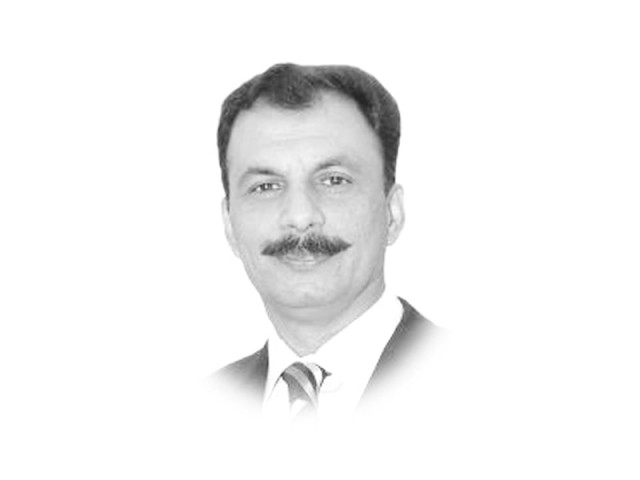Averse to ethics
Can media organisations survive in a competitive market if they respect ethical norms?

The writer is a senior police officer posted to Khyber-Pakhtunkhwa. He tweets @alibabakhel
In an ideal context, governments would enact media legislation or facilitate the media regulatory apparatus by following the spirit of self-regulation by the media itself. However, the Supreme Court has now told Pemra to immediately enforce the new code of conduct. While covering sensitive issues, the irresponsible professional conduct of a few journalists and organisations convinced the government to formulate a new code of ethics. However, while the EMCOC is being appreciated, it has also given birth to a myriad of questions.
If the media does not voluntarily adhere to upholding ethical values, what is the solution? Can we restrict the government to only performing its legislative function and absolve it of responsibility when it comes to its regulatory functions? Whose responsibility is it to protect the privacy of citizens and who is the custodian of society’s ethical values? In the presence of a hierarchy of courts, should media be permitted to carry out media trials, influence public opinion or the mindset of presiding officers? Is our media, which is still in its embryonic stages, capable of self-regulation? Can media organisations survive in a competitive market if they respect ethical norms?
In Pakistan, we’ve seen examples of privacy and ethical values being sacrificed under the pretext of freedom of media. Unbridled freedom has given birth to several concerns and there is an urgent need for the media to draw a line when it comes to its freedom and respecting privacy of individuals. To discourage the spreading of false allegations, the EMCOC has incorporated the term “aspersion”. While this depicts good intentions of the state, however, there is a dire need for an institutional apparatus to deal with violators. For around half a century, the electronic media remained primarily under state ownership. The rapid growth of privately-owned electronic media outlets over the past decade or so has introduced a new interpretation of the term ‘freedom’, where privacy and ethical values seem to be excluded.
The ECMOC also defines the terms “conflict zone”, “proscribed organisation”, “propaganda”, “sectarian” and “indecent”. It has made an effort to harmonise the meanings of the terms “terrorist” and “terrorism” in the context of the Anti-terrorism Act of 1997. Section eight of the EMCOC provides guidelines regarding coverage of crimes, accidents and incidents of violence and for the first time the rights of victims have been recognised, which means that the identity of victims of kidnappings, terrorism, accidents and rape cannot be revealed.
Our dilemma is that we often confuse ethics either with morality or with the law. Morality primarily relates to an individual’s sentiments that enable him or her to distinguish between right and wrong. Ethics reflect a collectivist approach of a society and are the outcome of its collective will. Laws, on the other hand, are binding, and their enactment and enforcement are the prerogative of the state.
Running of a private media organisation has the main goal of maximising profits. In the pursuit of profits, ethics are sometimes sacrificed. Without owners of media organisations getting their priorities right, notions of adhering to ethics may remain a bunch of glittering generalities. An example of this is the way the case of a model accused of money-laundering has been handled. Instead of highlighting the case in a rational, substantive manner, the media remain focused on peripheral, meaningless non-issues, with debate on a key national issue being compromised as a result. Similarly, in talk shows we see many anchors enjoying and inciting confrontations between participants, sometimes resulting in the use of foul language.
When it comes to the print media, it seems that the days of newspapers adhering to the tradition of publication of corrections, clarifications and apologies, with a few exceptions, are over. This area has also been addressed by the EMCOC, which is welcome.
What is needed in our media industry is the airing of research-backed content. Often there seems to be a lack of interest in verifying facts, resulting in what I would term as the ‘breaking news syndrome’, which compromises ethical standards. Live coverage of particular events, coupled with concerns of commercialism can compromise editorial oversight. Therefore, the new code of conduct requires enhanced coordination between the hosts and producers of shows. In addition, to ensure the monitoring and implementation of the EMCOC, Section 17 has made it binding upon the licensee to appoint an in-house monitoring committee. Media organisations can also voluntarily appoint ombudspersons to address public complaints and ensure compliance with the EMCOC.
The implementation of the EMCOC requires cooperation among various stakeholders including Pemra, journalists, the journalism departments of universities, media organisations and media proprietors. If this doesn’t happen, the EMCOC, like the codes of ethics of the past, will also end up being shelved in libraries. The synchronisation of media ethics with ethics of the society at large requires collective efforts to be made by both media and society.
Published in The Express Tribune, October 9th, 2015.
Like Opinion & Editorial on Facebook, follow @ETOpEd on Twitter to receive all updates on all our daily pieces.













COMMENTS
Comments are moderated and generally will be posted if they are on-topic and not abusive.
For more information, please see our Comments FAQ